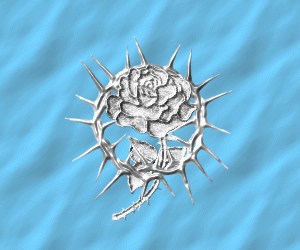
of
Arad Doman
on Tales of Ta'veren MUSH
and Concordat of Illian MUSH


House Dhamsid is essentially a merchant house raised high, and then grown wealthy through the skillful exercise of feminine wiles and affectations by its women. Like many Domani merchants, the founder of House Dhamsid was a woman, Eliyah Dhamsid., who was known throughout the city as a skillful and cunning trader. During a particular harsh winter, NE 478, and then through an extremely dry growing season, many of the nation's farms had failed harvests. It did so happen that the country was embroiled in one of the ceaseless parade of wars with its traditional enemy to the south, Tarabon.
The nation's army was deployed all across Almoth Plain, and the supply trains were draining away what scant wheat and oat there was. With the Crown deeply leveraged, the King was unable to simply import grain, and pay for it from the Royal Coffers. The King, Adul, needed to borrow money to buy the provender needed to sustain his military campaigns. Alas, with most of his nobles tied up with equally costly deployments, His Royal Majesty was forced to look elsewhere, and indeed he looked on the prosperous mercantile families of his capital. Eliyah, and others of her class, were able to lend the crown a rather impressive sum, which further allowed the king to continue his martial ventures.
The King was grateful to many of the merchants who lent him funds, and he bestowed upon them the rights and privileges of nobles, creating estates and granting them the esteem of the Crown. That the war, now dubbed "The Three Summers War," ended with a Tower-forced treaty that largely left matters between the coastal powers unchanged was of no concern to King Adul. Thus, Eliyah, a spice trader, was raised to Eliyah, Lady of Dhamsid, and was granted the lands surrounding the town of Caisapene, which itself was centered on a small fortress that had belonged to an extinct noble house, and had reverted to the possession of the Crown. Indeed, Lady Eliyah moved in, and promptly went about the business of refurbishing the fortress, turning it into a splendidly appointed residence suitable to a grand noble family.
Through the years, the House's trading ventures proved lucrative, and through successive generations of High Seats, their interested diversified, although the family still was known mainly for its dealings in the spice and perfume trade. They constructed a manor within the capital city, and later became rather prominent members of the Court, with Lady Amira Riayad of Dhamsid, becoming the Royal Governess to the Boy-King Saram, and later as he approached majority, his mistress. This did earn her the enmity of the Regent, the Queen Mother Asene. The two became fierce rivals for the King's attentions that ultimately resulted in the Queen Mother withdrawing her presence from the court, and cloistering herself in mountainside bartizan, where she later penned the Asene Verses, poems filled with sorrow and bitterness. It should be noted that Lady Amira was ultimately assassinated by a poisoned necklace, but no link was ever made between this wicked deed and the exiled Regent.
It is believed that the children of Lady Amira, who did marry a prominent general, but still remained in the King's affections, were fathered not by her husband, but the King himself. It is the line of Lady Amira that holds the title of Dhamsid currently.
In recent years, House Dhamsid has risen to the very highest circles of Domani society, with members often attaining prominent places at Court. In Lady Dareane's own time, she found herself in a lofty position at Court, one of the major counselors of the King, as well as close confidant, and his speculated lover, despite King Vadin's Queen being very much a presence. Lady Dareane's husband was wounded defending a prince of the royal house during the Aiel War, and her children were fostered in the Royal Palace, as a reward for her husband's valiant service.
The Dhamsids trade in spices and perfumes, as well as lumber and carved furnishings. The estates contain many glassed gardens in which exotic blooms are cultivated to create many of the exotic scents that are a significant source of income for the family, and a small compound of secured warehouses in the seaport of Bandar Eban is a hub of the spice trade, most of which is provided by the Sea Folk from unknown ports of call. The more rugged portions of their estate are thick with the pale and luminous timber trees that are prized in Arad Doman, and many skilled carpenters and carvers are in service to the house, manufacturing furniture and other goods in the famous light and slender Domani style. Further, the tenants of the House estates raise wheat, oats, apples, figs and other fruits that are shipped and exported throughout the country and beyond.
House Dhamsid's primary estate is centered upon the maritime town of Caisapene, on the coast of Arad Doman, which takes its name from the family's walled stronghold now called Caisapene Hall, or alternately, the "The Briery." The original name of this mighty stronghold was Caisa'epine'dan, meaning "House of Thorns" in the Old Tongue. The actual structure of the building recalls this, as the walls are festooned with iron spikes, some nearly a span high. Within the walls, the splendid keep is nestled amid sunny courtyards and fine gardens, with onion-peaked domes and slender minarets fingering the sky.
Also, the family has several smaller holdings throughout its estate, as well as a mansion in the capital of Bandar Ebban.
